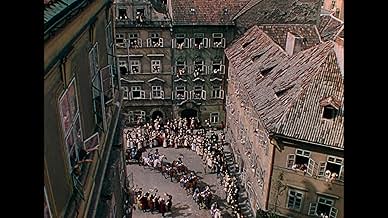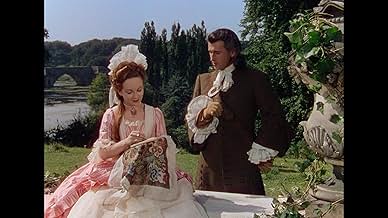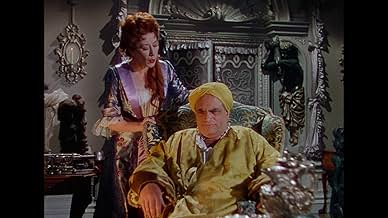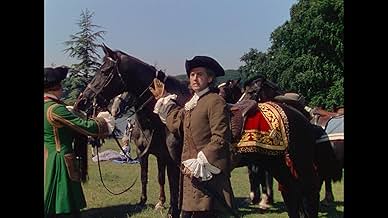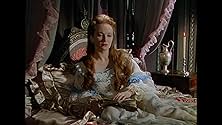Füge eine Handlung in deiner Sprache hinzuYoung Sophie Dorothea marries Prince George Louis but it's far from a love match. Then she falls for Swedish Count Philip Christoph von Königsmark.Young Sophie Dorothea marries Prince George Louis but it's far from a love match. Then she falls for Swedish Count Philip Christoph von Königsmark.Young Sophie Dorothea marries Prince George Louis but it's far from a love match. Then she falls for Swedish Count Philip Christoph von Königsmark.
- Für 1 Oscar nominiert
- 1 Gewinn & 2 Nominierungen insgesamt
- The Electress Sophia
- (as Francoise Rosay)
Empfohlene Bewertungen
Actually, most of the reviewers here actually do ample justice to a production which excels in all departments, and succeeds in being a romantic film which balances passion with such intelligence that a powerful and moving tragic sense is conveyed of real people trapped in a world of inhuman artifice and formality. I think Dearden's work here has a powerful impact that is at least the equal of David Lean's later epics. It also often even reminded me of the sad fate of Kubrick's Barry Lyndon, like Koenigsmarck the commoner victim of a cruel aristocratic world, the reality of which is portrayed without illusions.
So why the poor overall rating? This really can't be justified, or tolerated, and I must be particularly lavish in my praise to help raise it up towards something nearer to it's true worth.
Once again, here in Britain, it was only thanks to the ever-excellent 'Talking Pictures TV' that we got a chance to see this neglected masterpiece at all. Really the general churlishness of modern neglect towards this utterly magnificent film is very hard to fathom.
Perhaps it is merely the jealousy of mediocrities who can never hope to grasp or emulate such an intelligent movie, in which the historical background is correctly but lightly established, or to command such a superbly well-constructed portrait of passion and intrigue in high places. In Britiain we seem to have developed an aversion to a past so often sweepingly dismissed as both hopelessly outmoded, as well as politically irredeemable, by an influential cultural cabal that wants to sweep away the inconveniently substantial achievements of earlier generations, which they find so uncongenial to their own doctrinaire, yet strangely insecure and intolerant ideals.
Objectively, the direction, screenplay, acting, costumes, set, camera-work and general mise-en-scene are of an uniformly high standard. Only a philistine, or a doctrinaire but shallow cineaste who feels threatened by having the grand achievements of his parent's and grandparent's generations, as it were, looking over his shoulder, could possibly dismiss such a magnificent and effective film. Some fellow-travellers of both regrettable tendencies seem to be sitting in judgement of this fine film here, but not enough of them to relegate it to a miserable 6.6, surely?
Amidst the political machinations of the House of Hanover in its striving for the throne of England 300 years ago, a young and beautiful woman forced to be the wife of the boorish future King falls for a young and dashing Swedish nobleman, and vice versa. While a powerful lady of the court is also passionately in love with the soldier. As always befits our Betters they all know their duty – to power and money, much to the unhappiness of all those only in love. Although initially it may take a few minutes to get into the politics of another world, it's a mesmerizingly told tale with solid emotional acting moving through some colourful luxurious sets and alternating between intense romance and somber intrigue, even a little swash. Of the main stars Stewart Granger was seldom more er masculine and although Joan Greenwood was even more wishy washy than usual it was perfectly played and believable. One thing: did Sophia's letter to her son ever get delivered?
It might be more of a hit with the ladies, but gents too should enjoy it, with or without hankies.
The Stuarts were cousins of the Tudors, and when the great Elizabeth I died in 1603 she was without Tudor heirs. James VI of Scotland (son of Elizabeth's rival and cousin, Mary, Queen of Scots) became James I of England. James I had two sons and one daughter. The daughter, Elizabeth, married a German Protestant prince, the Elector of the Palatinate (now part of the Czech Republic). Her descendants included Prince Rupert, the brilliant cavalry general for his uncle King Charles I in the Civil Wars of the 1640s. One of the descendants of Elizabeth Stuart was Princess Sophia, the wife of the Elector of Hanover. In the 1690s, the elderly Princess found that (except for Princess Anne of England, and her son William, Duke of Gloucester - a sickly youth who would die in 1701) she was next in line to the British throne if anything happened to King William III and his wife Queen Mary II. If anything happened to Princess Sophia, her son Prince George inherited her claim to the British throne. Sorry for this confusion of inherited titles presumptive, but that is how it went.
Prince George was not a loveable person. He was a demanding bully. He had married a cousin named Sophia Dorothea of Celle for her inheritance (needed to beef up his German territories around Hanover). George's father (the Elector of Hanover) had a mistress, Countess von Platen, who wielded great influence in the German state. This Countess introduced a young Swedish aristocrat, Count Philippe Koeningsmarck, to the court. She liked the Swedish Count, who was a military expert. Actually she more than liked him - she adored him. While Koeningsmarck was grateful, he did hold her at arms length. This would prove a mistake.
His second mistake was that he and Princess Sophia Dorothea of Celle met and became too chummy. Letters and diaries of the Princess survive, and suggest a platonic relationship, but it might have been closer. It angered the Countess, who felt her friendship was slighted. It angered Prince George, who (while he had many mistresses) did not like the snickers of people thinking him a cuckold. One day Koeningsmarck was called to the royal palace. He was never seen again, although many years later a skeleton of a man was found buried in an obscure corner there. Platen (most likely) decoyed the Swede, and had him assassinated - she found her influence in court dead after that, and in her last years was thought to be plagued by Koeningsmarck's ghost. In European circles the scandal spread, especially as it affected the way Englishmen viewed the prospected Protestant heirs to the throne. Had the choice of Hanovarians been needed to be made in 1695 - 1701, chances are George and his mother would have been by-passed. But the War of the Spanish Succession began in 1701, and lasted through the reigh of Queen Anne (the last Stuart). Her half-brother, James the Old Pretender (father of Bonnie Prince Charlie)was a Catholic who supported his cousin Louis XIV in the war. Prince George, despite the scandal, became King George I in 1714. And his descendants have ruled Britain ever since.
Poor Princess Sophia Dorothea of Celle never was Queen. George did not divorce her, but he had her imprisoned in her castle at Celle until she died in 1726. Her son and daughter by George never forgave him, and the boy (the future King George II) made life very difficult for his father as a result. George I died in 1727. There is a story (which one would like to believe) that while visiting Hanover shortly after his wife's death, a note was thrown into his carriage from a crowd. The note was from Sophia Dorothea, and it cursed George for his bullying and cruelty to her and others. George, reportedly, had a seizure reading this vitriolic message from the dead, and was paralyzed as a result until he died. Unfortunately this story seems to be false.
The film is pretty close to the actual tale, though it makes the relationship between the Princess of Celle and Koeningsmarck seem more of a love affair than it may have been. Stewart Granger is fine as the Swedish Count, and Joan Greenwood (she of the plummy toned voice) is equally good as the Princess. Peter Bull, that splendid British heavy, does a good Prince George, bullying his wife and servants, but capable of sly viciousness when he wants to retaliate against Koeningsmarck. And Flora Robson shows the inner demons driving her to destroy the young protegee who can't reciprocate a love he never had in the first place. Anthony Quayle, as one of the rivals of Koeningsmarck at the little royal court, is as good as he usually is, and lives up to the warning of never turning your back on Quayle in a duel!
Oddly enough, the Koeningsmarck family left a larger shadow on European history than this film suggests. At one point in the script, Philippe mentions that his younger brother (Count Karl von Koeningsmarck) was tried for murder. It is true, and has so far escaped a motion picture treatment. In 1681, Lady Elizabeth Ogle was the richest heiress in England, and was being romanced by Koeningsmarck and by Thomas Thynn of Longleat, who was the richest commoner in England. Karl von Koeningsmarck had three thugs attack and kill Thynn in his coach in London. The three thugs were found guilty of the murder and executed, but the Count (due to influence from King Charles II) was acqitted. However, Count Karl died a few years afterwards. He and Phillipe had a sister Elizabeth, who had an affair with Augustus the Strong, Elector of Saxony and elected King of Poland. Their illegitimate son was Maurice, Marachel de Saxe of France, the leading European general from 1722 - 1750. Marachel Saxe was known to be particularly rough in leading his men against armies led by members of the Hanovarian royal family in the wars of this period. Apparently he was trying to even the score for poor Uncle Philippe!
This may have been Joan Greenwood's finest performance on screen. She's really the only decent person in this entire cast. For reasons of politics, she's rushed into a marriage with George Louis and has two children by him, a boy and girl. At the time this is all taking place in the 1680s, there's no reason to suspect that these kids will be nothing more than the Electoral Princes of Hanover in the Holy Roman Empire.
But through their grandmother, played here by the indomitable French actress Francoise Rosay, they are descended from James I, the first king of the United Kingdoms of Scotland and England. She never lets them forget that for a moment.
Actually in fact a whole lot of people in 1689 would have to clear out of the way for Peter to become King of Great Britain. But over the next two decades, that's exactly what did happen. One thing the Hanover clan had going for them, they were firm Protestants and at that point there were too many people in Great Britain who had a vested interest in an unquestioned Protestant succession. It was the Hanoverian ace in the hole.
But before all these events occur Joan Greenwood falls head over heels for the dashing Swedish Count Philip of Konigsmarck as played by Stewart Granger. Granger probably plays Konigsmarck a lot better than he actually was, which was a military man who was not above a little bedroom politics to get what he wanted. Before becoming involved with the younger and more attractive Greenwood, Granger was providing a little nookie on the side to Flora Robson. Robson was the old mistress of the Duke Ernest Augustus played here by Frederick Valk, but the old girl wanted something a little livelier which Granger provided for a few favorable mentions. As in real life Granger moved away when he found something better and Flora reacted with the fury of a woman scorned.
Some of you might recognize a bit of Anna Karennina in this story and I wouldn't be surprised if Count Tolstoy took this story as inspiration when he wrote his epic classic.
Peter Bull and Joan Greenwood are the direct ancestors of the present monarch of the United Kingdom and her family. In 1715 Peter Bull became George I of Great Britain and distinguished himself by never learning to speak one drop of English. In fact all he saw Great Britain as was a cash cow to finance various continental Hanoverian ventures. But the little boy in this film grew up to be George II and so on and so on until Elizabeth II.
For what happens to lovers Granger and Greenwood you have to watch the film for. It's a story that the royals aren't exactly proud of.
Wusstest du schon
- WissenswertesThis was the first Ealing Studios movie to be shot in colour.
- Zitate
Konigsmark: There are four of us. My sisters have been liberal with their favours in half the courts of Europe. My brother was tried for murder in England. As for me, I'm no better than the others. There's something in our blood that makes us worthless... for anyone one.
- Crazy CreditsOpening credits prologue: FROM a Germany that was then a collection of small and independent States, GEORGE LOUIS of Hanover succeeded to the throne of England. As KING GEORGE the FIRST he left behind him a prisoner in the CASTLE of AHLDEN - - a woman whose name he tried to obliterate from the pages of history, whose story he determined should die with her. It was the story of the woman who had been his wife......SOPHIE DOROTHEA.
- VerbindungenReferenced in Ealing Studios stellt sich vor (2012)
Top-Auswahl
- How long is Saraband?Powered by Alexa
Details
- Erscheinungsdatum
- Herkunftsland
- Sprache
- Auch bekannt als
- Saraband
- Drehorte
- Produktionsfirma
- Weitere beteiligte Unternehmen bei IMDbPro anzeigen
- Laufzeit1 Stunde 36 Minuten
- Seitenverhältnis
- 1.37 : 1
Zu dieser Seite beitragen


